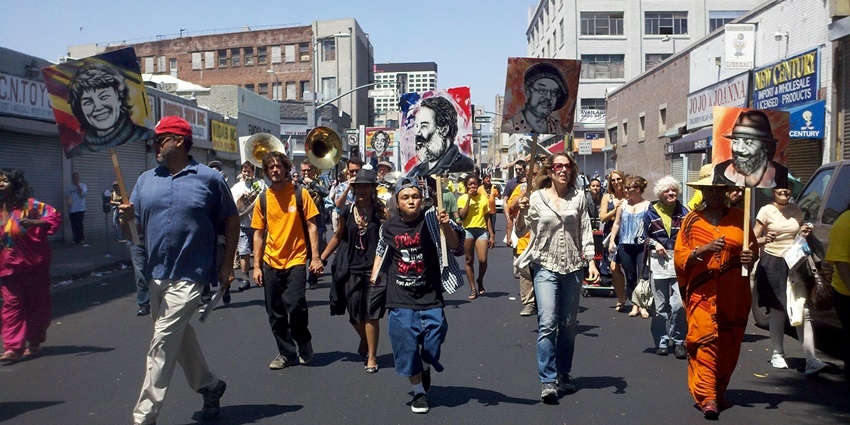“Community art is code for bad art”, declares John Malpede, the founder of the near 30-year-old performance group Los Angeles Poverty Department (LAPD). Constituted primarily from homeless and formerly homeless Skid Row inhabitants, this downtown LA group – currently 25 persons strong – takes the politics of ‘bad art’ seriously. Forever chasing cheap real estate, the art community in LA has long hovered at the edges of Skid Row. LAPD, however, belongs to the membership of Skid Row’s socially vulnerable and it has maintained a critical relationship to the gentrification that often follows in the art community’s wake.
Back in the mid-1980s when LAPD formed, debates about the New York art world’s relationship to gentrification, real estate development, and the politics of homelessness were central issues for many artists. Now the Lower East Side is nearly complete as an extension of Soho’s boutiques and up-market eateries, and rents in the outer reaches of Brooklyn, where new art communities are forming, continue to soar. While New York’s artists lost much of their political edge within former Mayor Michael Bloomberg’s corporate New York, LAPD stands as a model of sustained critical public art practice.
Like much of LAPD’s work, this is a form of documentary-as-performance art
The Queens Museum exhibit is divided into two large spaces. Viewers enter a gallery of carefully staged archival materials – video, photography, and textual information – through a large room filled with prison-issue bunk beds. This is the set for one of two major performance works entitled State of Incarceration (2010-ongoing). Now empty of its performers (except for modest video vignettes shown on screens hanging from three lower bunks) the space serves as a visceral reminder that a third of the Skid Row homeless have spent time in California’s notoriously overcrowded prison system. (The irony of the group’s shared acronym with the Los Angeles Police Department here speaks the loudest.)
The second performance, Agentes & Activos, the Spanish language premiere of Agents & Assets (2001-ongoing), was developed in collaboration with Drogadictos Anonimos, a drug recovery group based in Corona, Queens. Together with members of LAPD, several men from the Corona group performed a ‘found text’ script drawn from a 1998 House of Representative’s hearing on CIA involvement in drug trafficking in California.
Like much of LAPD’s work, this is a form of documentary-as-performance art. A clumsy term, yes, but one that I prefer to the recent art world embrace of aesthetic ‘reenactment’, since the latter often seems to displace any political reference and empties out historical specificity in a way that LAPD does not. The performance script connects, through the juxtaposition of political speechifying, the targeting of inner city communities (and women in particular) with crack cocaine, the so-called Iran-Contra affair, and the involvement of Democratic Senator John Kerry (now the Secretary of State) in a short-lived enquiry that has now been largely forgotten.
While most of the performers fully inhabited their roles as congressmen and women, the occasionally awkward delivery and ill-fitting suit only reinforced the documentary reality of the script’s disclosures. Back in regular street clothes for a post-performance discussion, the larger political narrative was brought home by the personal stories of the cast members from Drogadictos Anonimos, who took part in a dialogue with veteran HIV activists working in New York and Eastern Europe, as well as with members of the audience. If this is indeed ‘bad art’, then New York needs more of it.
Online exclusive published March 2014
